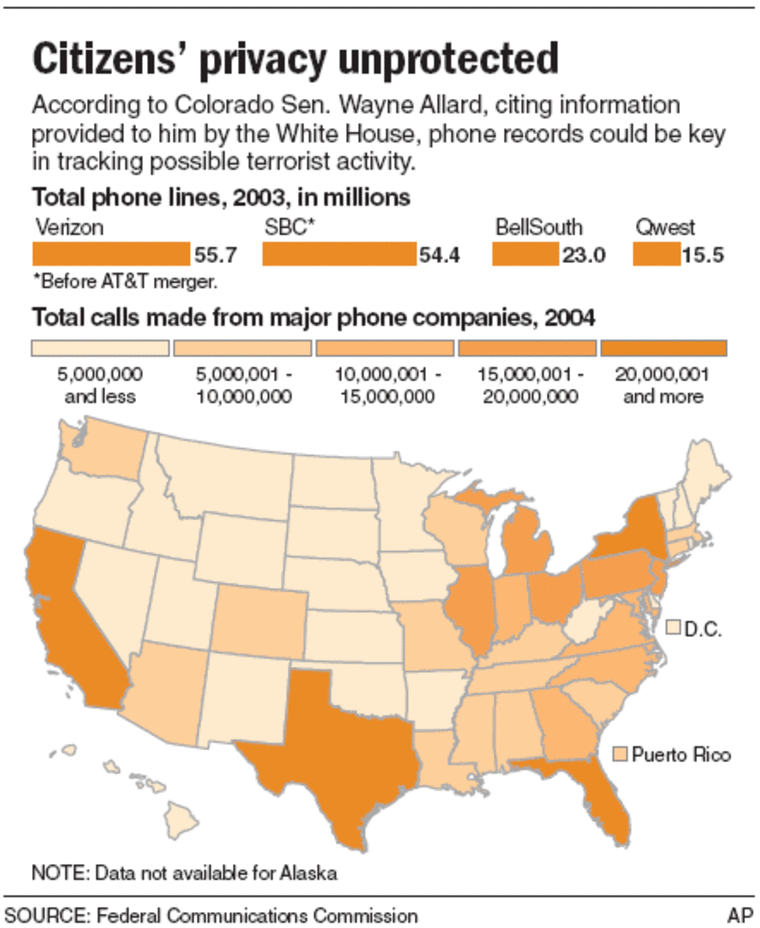Former Qwest Communications CEO Joseph Nacchio refused to share customer telephone records with the National Security Agency because of authorities did not want to use "any legal process" to justify their request, Nacchio's attorney said Friday.
The CEO was worried that cooperating with the NSA without a court order or warrant would violate federal privacy laws, said Nacchio's attorney, Herbert Stern.
"When he learned that no such authority had been granted and that there was a disinclination on the part of the authorities to use any legal process, including the Special Court which had been established to handle such matters, Mr. Nacchio concluded that these requests violated the privacy requirements of the Telecommunications Act," Stern said.
Nacchio then told his employees to reject the NSA requests, Stern said. His successor, Richard Notebaert, halted talks with the NSA in 2004, according to USA Today.
Qwest was the lone holdout in the telecommunications industry when it came to giving the records to the NSA, breaking ranks with fellow former Bell companies, formed after AT&T was split into smaller companies.
Bucking other Bells isn't exactly new for Nacchio, who embraced fiber-optic technology at Qwest as his peers were clinging to long-distance revenue.
"Joe Nacchio, if anything, was the antithesis of your standard Bell head," said Thomas Friedberg, a consultant, former financial analyst and a former executive at U S West. "So much of the controversy of Joe Nacchio is he bucked the Bell system."
Denver-based Qwest Communications International Inc. has been mired in criminal and ethics allegations for years. It was accused of massive fraud by the government and later restated $3 billion in revenue. Former executives have been accused of wrongdoing — including Nacchio, who faces 42 counts of insider trading accusing him of illegally selling $101 million in company stock after privately learning Qwest might not meet its financial goals.
But it was apparently Nacchio who agreed with Qwest's attorneys that surrendering "call-detail records" to the NSA was wrong — putting him squarely on the side of the little guy.
AT&T Corp., Verizon Communications Inc., and BellSouth Corp. began sharing records of tens of millions of their customers' phone calls with the NSA shortly after the 2001 terror attacks, according to USA Today, which cited anonymous sources with direct knowledge of the program for a story Thursday.
The newspaper said Nacchio was "deeply troubled" by the implications of the request. Qwest spokesman Bob Toevs declined comment on the newspaper story.
The telecom companies would have had to balance the NSA request with Federal Communications Commission rules that bar unauthorized releases of customer information, said Bruce Henoch, a communications attorney with Shulman and Rogers in Rockville, Md.
"If you are a company that releases improperly, you open yourself up to lawsuits from customers, FCC filings," he said. "When people make phone calls and trust records to telecom companies, they trust they will be kept private unless there's a legal request to turn them over.
"The question turns on whether this is a legal request the companies should have complied with," Henoch said.
Sen. Ken Salazar, D-Colo., praised Qwest for its decision.
"I think that's what telephone companies ought to do," Salazar said. Sen. Wayne Allard, R-Colo., said he doesn't support domestic eavesdropping.
Qwest services some 14.5 million local phone lines in 14 mostly Western states. Qwest representatives declined comment Thursday on Nacchio's role and his attorney did not return a call.
A former AT&T executive, Nacchio was hired to head Qwest in 1997 when it was installing fiber-optic networks along railroad rights-of-way. He attracted Wall Street's attention after engineering Qwest's acquisition of U S West but resigned under pressure in June 2002, about eight months before Qwest restated revenue for 2000 and 2001.
"There is some inherent irony that Joe Nacchio was able to put a blockade in front of the government, but the NSA request is very different than the stock trading and financial statement issues that he confronted as Qwest CEO," said Jacob Frenkel, a former federal prosecutor and Securities and Exchange Commission enforcement lawyer.
According to USA Today, the NSA told Qwest that not sharing the phone records could compromise national security and affect its chances at landing classified contracts with the government — two issues that play a role in Nacchio's legal woes.
Nacchio's own attorneys have said they were unable to question him for months about classified information he may have, apparently a result of Qwest's government contracts.
Nacchio has argued that when he sold his stock, he believed Qwest was about to get a boost from secret government contracts.
